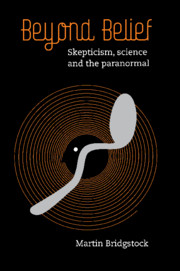Book contents
- Frontmatter
- Contents
- Preface
- Introduction: The paranormal and why it matters
- Chapter 1 The nature of science
- Chapter 2 The paranormal
- Chapter 3 Skepticism – from Socrates to Hume
- Chapter 4 Modern skepticism
- Chapter 5 Bringing skepticism down to earth
- Chapter 6 Skepticism, ethics and survival
- Chapter 7 Skepticism beyond the paranormal
- Bibliography
- Index
Chapter 6 - Skepticism, ethics and survival
Published online by Cambridge University Press: 05 April 2010
- Frontmatter
- Contents
- Preface
- Introduction: The paranormal and why it matters
- Chapter 1 The nature of science
- Chapter 2 The paranormal
- Chapter 3 Skepticism – from Socrates to Hume
- Chapter 4 Modern skepticism
- Chapter 5 Bringing skepticism down to earth
- Chapter 6 Skepticism, ethics and survival
- Chapter 7 Skepticism beyond the paranormal
- Bibliography
- Index
Summary
We have seen that paranormal belief can have extremely dire effects. The deaths of Caleb Moorhead and Liam Williams-Holloway were both, in part at least, probably caused by the paranormal beliefs of their parents. We also saw that a young woman's credulous approach to paranormal beliefs made her vulnerable to a ‘clairvoyant’ who relieved her of large amounts of money. We have also seen that many skeptics have concerns about the suffering caused by some paranormal claims, and the threat they pose to science.
This suggests an important dimension to scepticism, an ethical perspective, and we will look at this more closely in this chapter. The implication is that in some cases skepticism may not simply be a useful set of intellectual tools, but an approach to human affairs that can have profoundly beneficial effects. If this is so, then we should be able to discern some concern within skepticism for right and wrong conduct. That is, skepticism has an ethical dimension, giving us guidance about right and wrong conduct. We will begin by asking a rather surprising question: can it be unethical to hold certain beliefs? As we will see, some very serious thinkers argue that this is so. We will also look at some aspects of skeptical behaviour and will try to sketch an outline of a skeptical ethic.
A major approach to ethics is termed ‘consequentialism’ and it focuses on the consequences – the results – of particular courses of action.
- Type
- Chapter
- Information
- Beyond BeliefSkepticism, Science and the Paranormal, pp. 140 - 163Publisher: Cambridge University PressPrint publication year: 2009

